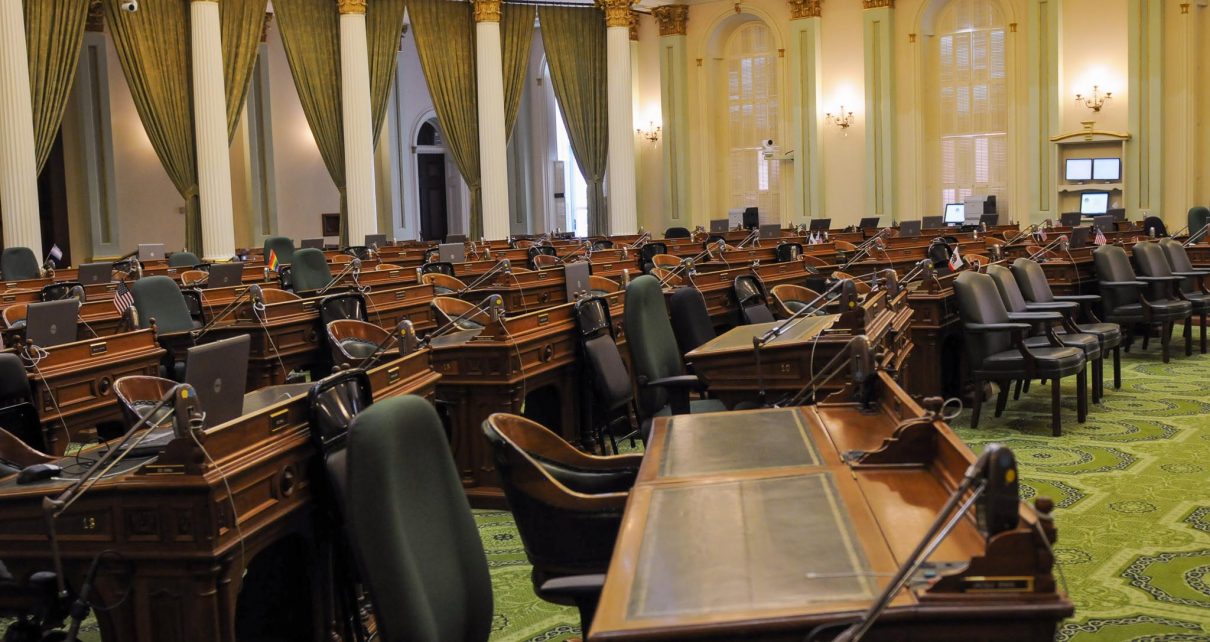
California State Assembly. (Photo: Kevin Sanders for California Globe)
The Role of the Legislative Ethics Committees
Both houses have extensive ethics and conflicts of interest rules, and are bound by constitutional and statutory ethics rules
By Chris Micheli, February 28, 2020 6:27 am
Ethics in the California Legislature is an important topic. As such, both houses of the Legislature have their own ethics committees. The Senate has adopted an official Code of Conduct for its members, while the Assembly has not. Nonetheless, both houses have extensive ethics and conflicts of interest rules, and both are bound by constitutional and statutory ethics rules as well.
The Assembly Legislative Ethics Committee consists of six Members of the Assembly who are appointed by the Assembly Speaker. The committee has the power to investigate and make any appropriate findings and recommendations concerning violations of the rule by Assembly Members. The Committee’s authority is set forth in the Standing Rules of the Assembly and in Article 3 (commencing with Section 8940) of Chapter 1 of Part 1 of Division 2 of Title 2 of the Government Code.
Under the Assembly Rules, any person may file a verified complaint in writing stating the name of the Assembly Member who is alleged to have violated any standard of conduct. The written complaint must set forth the particulars of the alleged violation “with sufficient clarity and detail to enable the committee to make a determination.”
The Committee may issue advisory opinions to Assembly Members regarding the standards of conduct and their application and construction to the house’s members. The committee may also secure an opinion from the Legislative Counsel or it can issue its own opinion. Any committee advisory opinion must be prepared by committee members or its staff and must be adopted by the committee.
The Committee is required to conduct twice a year an orientation course on the relevant statutes and regulations governing official conduct of Assembly Members. The Rules Committee actually establishes the course’s curriculum. In addition, at least once every 2-year session every Assembly Member and every Assembly employee must take this course. The Committee is also charged with conducting lobbying ethics courses for registered lobbyists.
The Senate Committee on Legislative Ethics is appointed by the Senate Committee on Rules and it consists of six Senators. In addition to this Committee, the Rules Committee appoints an ethics ombudsperson to assisting in the resolution of potential ethical violations, as well as assisting the Senate in providing remedies for retaliatory conduct, to ensure that an informant or complainant does not suffer adverse consequences with respect to his or her employment.
The Senate ombudsperson is accessible to Senators, officers and employees of the Senate, as well as members of the public who wish to provide information or seek guidance about ethical standards or possible violations of standards before filing a formal complaint. All communications are confidential between the informant or complainant and the ombudsperson. The ombudsperson may refer the information to the Rules Committee Chair, the Legislative Ethics Committee Chair, and/or the Secretary of the Senate. In all cases, the identity of the informant or complainant is kept confidential, unless that person consents.
The Senate Committee is required to maintain a public hotline telephone number for purposes of contacting the ombudsperson. The complaints received through the hotline are considered informal complaints and the existence of the complaints must be kept confidential.
In addition, the Committee must formulate and recommend standards of conduct for Senators, as well as the officers and employees of the Senate in performing their legislative responsibilities. At the request of any Senator, officer or employee of the Senate, the Committee must provide an advisory opinion regarding the standards of conduct of the Senate on the general propriety of past, current or anticipated conduct of that Senator, officer or employee.
The Committee also annually adopts “a clear, informative, and usable manual for the Senate” based on the standards of conduct adopted by the Senate. Similar to its Assembly counterpart, the Committee conducts annual workshops for Senators, officers and employees of the Senate. At least once every 2-year session, each Senator, officer and employee of the Senate has to attend a workshop. Moreover, at least once every 2-year session, each Senator has to attend an individual training or review session conducted by the ombudsperson.
Readers should also be aware of two common misconception. The first is that the so-called “revolving door” limitation applies to legislators and staff alike. Under Article IV, Section 5(e) of the state constitution, “The Legislature shall enact laws that prohibit a Member of the Legislature whose term of office commences on or after December 3, 1990, from lobbying, for compensation, as governed by the Political Reform Act of 1974, before the Legislature for 12 months after leaving office.” No such limitation in the state constitution or statute applies to legislative staff.
In addition, there is a misconception that only a court of law can remove a legislator from office. Under Article IV, Section 5(a)(1) of the state constitution, “each house of the Legislature shall judge the qualifications and elections of its Members and, by rollcall vote entered in the journal, two-thirds of the membership concurring, may expel a Member.” While this has not been used in recent decades, it is an available power to the Legislature.
Ethics will always play an important role in the legislative process. Legislators, staff, lobbyists and those working in and around the State Capitol should be aware of the role of the Assembly and Senate Ethics Committees and the duties and powers of these committees.
- Quiz on California Constitution and Statutes - March 22, 2025
- Quiz on California Local Governments - March 21, 2025
- Rights of Third Parties under the Commercial Code - March 20, 2025





3 thoughts on “The Role of the Legislative Ethics Committees”